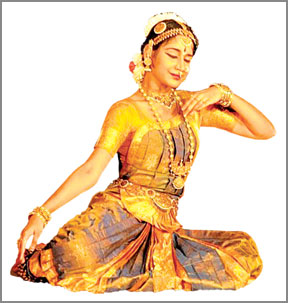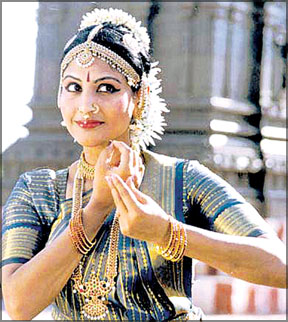Tamil grammar scripts
Subhashini Pathmanathan
The Tamil grammar was reputedly composed by Agasthiar whose work is
known as Agasthiyam. But unfortunately the original script has been lost
due to ravages of time. One of Agasthiar’s 12 disciples was Tholkaapiyar
who is said to have written Tholkaapiyam, the oldest Tamil grammar.
There are many commentaries written on Tholkaapiyam. Some outstanding
commentaries were written by Ilampooranaar, Theivachilaiyar, Kallaadar,
Peraasiriyar, Senavariyar and Nachinaarkiniyar.
|

Elegance is an essential feature in dance |
However the commentary written by Ilampooranaar is considered to be
the only complete version available. Tholkaapiyam is divided into three
important chapters. Eluthu-athikaram deals with prose, Sol-Athikaaram
deals with words and Porul-Athikaaram deals with the meaning of the
words.
Porul-Athikaaram is divided into two categories: Akaporul and
Puraporul. Akaporul deals with love and chastity. Puraporul deals with
politics, government, education, business and worldly matters.
During the time of Tholkaapiyam, dance and drama were considered
under one topic Koothu. Those who practised dance and drama were called
Koothar, and they excelled in acting, dance, abinaya and adavus. Apart
from dance and drama, they excelled in music compilations.
At the time of Tholkaapiyar, dance and music were held in high
esteem. This is best expressed in the following lines in Tholkaapiyam:
Kootharum (male dancers), Paanrum (musician), Perunarum (those who
recite the kaddiyum) and Viraliyarum (female dancers).
Another line in Tholkaapiyam refers to Naadaka Valakku, Ulakiyal
Valakku and Naadaka Valakku. Tholkaapiyam also mentions that a variety
of Koothus (dance forms) existed in early days. For instance Valli
Koothu and Kuravai Koothu are some of those mentioned in the ancient
Tamil grammar. The essence of Bhava, which is popularly called rasa,
could be seen in Tholkaapiyam.
|

Dance and drama are considered under one topic |
In the chapter Porul-Athikaaram, the references to rasas could be
seen. Today there are nine rasas altogether in dance as against eight
rasas that existed in ancient times. Those eight rasas could be seen in
Tholkaapiyam. The origin of rasas could be seen in different stanzas in
Tholkaapiyam.
Hasya rasa denotes laughter. This rasa is called in Tholkaapiyam as ‘Nahkai’.
Karuna rasa in dance arises out of benevolence, but according to
Tholkaapiyam this rasa occurs due to poverty, loss and contempt.
Another rasa in today’s dance is Bibacha, which was regarded in
Tholkaapiyam as hatred. This rasa arises out of mental agony. According
to Tholkaapiyam this rasa arises out of mental agony.
The adbutha rasa originated from astonishment bava. This rasa was
called in Tholkaapiyam as ‘Marukai’. Acham rasa in Tholkaapiyam is
regarded as Bhiyanaka rasa. According to Acham rasa originated from fear
Bhava from thieves, animals, kings and Gods. Veera rasa arises out of
Bravery bava. According to ancient grammar bravery Bhava arises due to
fame and charity.
This Veera rasa is referred to in Tholkaapiyam as exultant mood.
Routhra rasa arises out of anger. Even Tholkaapiyam refers to this as
Vekuli. The Sringara rasa originates out of erotic Bhava, which was
regarded as Uvakai in ancient times. Then as now the usages of rasas
differ from one another. Yet the substance and origin of Bhavas remain
the same. |



